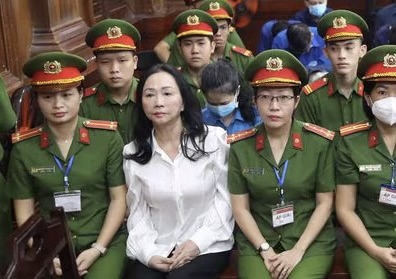Hanoi sentences Truong My Lan to death, but corruption remains endemic
The businesswoman allegedly pocketed 3% of Vietnam's GDP in 2022. With her 85 other people on the stand, about ten face the death penalty. Lawyers announce an appeal for life imprisonment. The arrest is part of the maxi-investigation 'Burning Furnace' launched in 2016, which reveals the distortions of capitalism in communist sauce.
Hanoi (AsiaNews) - The death sentence imposed on the 67-year-old real estate magnate Truong My Lan, which hit the front pages of the global media, is Hanoi's attempt to clean up its image in a general context of widespread corruption.
The trial of the century against the leader of the Van Thinh Phat Holdings Group, which began last March 5 and concluded yesterday, reveals the distortions of a country - and of a system hit at its foundations - which, behind the leadership of the single communist party, opened the doors doors to capitalism and the market.
From the former president forced to resign to the most anonymous of officials, the publicity given to the campaign to fight corruption - combined with the iron fist used in court - are actually a sign of fragility and an attempt to save face international level.
While awaiting the appeal, the manager's trial is characterized by impressive numbers: from her beginnings together with her mother in the cosmetics business at the central market of Ho Chi Minh City to her rise in real estate with the start-up of the company in 1992, which in 11 years obtained loans for 25 billion euros from Saigon Commercial Bank.
A figure that is close to 3% of the Vietnamese Gross Domestic Product (GDP) in 2022 of which, according to the accusation, she would never have repaid even one installment, helping to empty the credit institution's coffers. Together with her, 85 other people considered "accomplices" were sent to trial and, of these, at least 10 are at risk of capital punishment like her.
Starting from nothing, over time Truong My Lan has been able to exploit the turn towards communist capitalism in Vietnam (on the Chinese model) by purchasing building areas and properties, hotels and restaurants, in a nation where the land is - at least nominally - state property.
Thanks to a system of front men - and a proven network of bribes and corruption, at least according to the prosecution - the businesswoman made her way up the bank to the point of owning 90% of the shares, when the country's regulations limit this share for private individuals at a maximum of 5%. In this way she had access to the coffers and direct control in the appointment of directors and managers while obstacles in the way of business were overcome with millionaire bribes.
The numbers of the trial themselves are surprising: the evidence was contained in 104 boxes weighing four tons, 2,770 people were called to testify while the investigations were entrusted to 10 prosecutors and 200 lawyers.
Over the years, the woman allegedly orchestrated a fraud worth over 12 billion euros, accumulating a personal fortune of 100 thousand billion dong (equal to four billion euros) withdrawn and transported over time by her personal driver.
Now the defense lawyers have 15 days to appeal, in an attempt to have the capital punishment commuted to life imprisonment, while Lan immediately accused her collaborators, reporting "suicidal thoughts" as well as calling herself "stupid" for having allowed herself to be "involved in this very ferocious economic environment.”
In reality, the corruption problem in Vietnam is much more widespread and deep-rooted, going well beyond the spectacle process with which the communist authorities try to remake their image on the international level.
Lan's arrest in October 2022 is also part of an anti-corruption initiative called "Burning Furnace" started in 2016 and which, six years later, recorded a marked acceleration that hit - and overwhelmed - even the highest echelons of the country.
Two presidents and two heads of government have been forced to resign in recent years, but this is only the top of the iceberg which includes hundreds of communist party officials at all levels, some of whom have been asked to be sentenced to death.
Many people have been arrested or disciplinary sanctions imposed at all levels, in an attempt to stem a phenomenon that risks undermining the nation's economy as demonstrated by the affair relating to the "crisis" in vehicle registration.
According to the United Nations Development Program and other NGOs on the ground, corruption is so deep-rooted that in some provinces many people say they pay bribes just to get medical services and care even in public hospitals.







.png)










